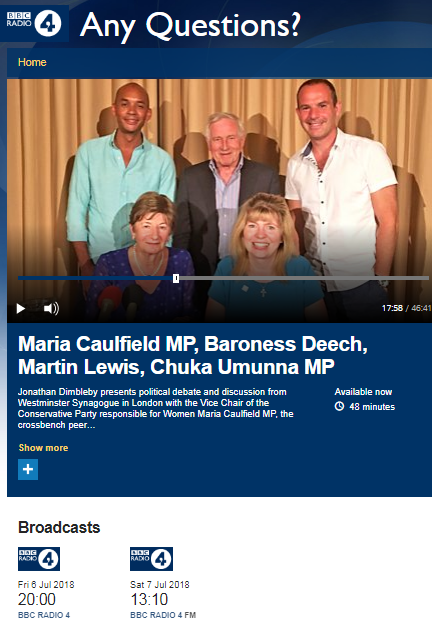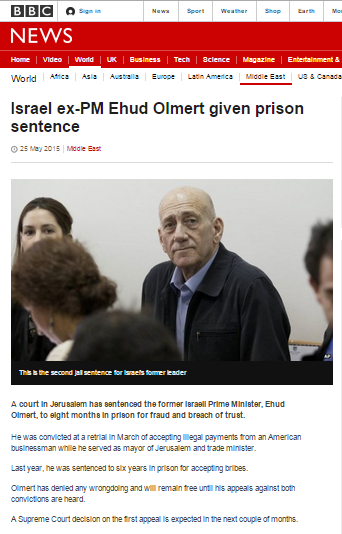The synopsis to the July 6th edition of the BBC Radio 4 programme ‘Any Questions?‘ reads as follows: [emphasis in bold added, emphasis in italics in the original]
“Jonathan Dimbleby presents political debate and discussion from Westminster Synagogue in London with the Vice Chair of the Conservative Party responsible for Women Maria Caulfield MP, the crossbench peer Baroness Deech, the founder of moneysavingexpert.com Martin Lewis and the Labour MP Chuka Umunna. Together they discuss the recent apparent second Novichok poisoning, Sadiq Khan’s approval of an inflatable in the shape of a baby Trump, a second referendum on Brexit, whether the UK should move its embassy to Jerusalem, whether the legalisation of recreational cannabis will follow the legalisation of cannabis for medicinal purposes.”
Presenter Jonathan Dimbleby is of course on record as saying that the BBC’s decision to uphold parts of complaints made concerning Israel-related reporting by Jeremy Bowen would “cause serious damage” to the corporation’s international standing, while describing those complaints as “lies and distortions”.
His interventions during discussion of that highlighted question are hence noteworthy.
The question from the audience member concerning the UK embassy in Israel – actually worded “why doesn’t the UK move its embassy to Jerusalem?” – came at 17:50 minutes into the programme (available here) and was immediately followed by a remark from Dimbleby:
Dimbleby: “As of course the US government has done – or Donald Trump has done…”
As was clearly stated at the beginning of the announcement concerning the relocation of the US embassy in Israel to Jerusalem, the decision was based on the ‘Jerusalem Embassy Act’ passed by the US Congress in 1995.
“The Congress, since the Jerusalem Embassy Act of 1995 (Public Law 104– 45) (the ‘‘Act’’), has urged the United States to recognize Jerusalem as Israel’s capital and to relocate our Embassy to Israel to that city. The United States Senate reaffirmed the Act in a unanimous vote on June 5, 2017.
Now, 22 years after the Act’s passage, I have determined that it is time for the United States to officially recognize Jerusalem as the capital of Israel. This long overdue recognition of reality is in the best interests of both the United States and the pursuit of peace between Israel and the Palestinians.”
As the second panelist – Baroness Deech – was giving her answer to the question, Dimbleby interrupted.
[21:51] Dimbleby: “Do you, do you, Ruth, do you not see that there is a big diplomatic – to put it mildly – dilemma when the city is divided between two communities – two groups that are both national groups – and that until you have managed to solve the Palestinian issue, it’s very difficult not to be sending the message that it’s more important to us that Israel has the capital in Jerusalem than it is that the Palestinians have an equal right to part of Jerusalem as their capital?”
Under the terms of the Oslo Accords signed by the PLO and Israel, the status of Jerusalem is one of seven ‘permanent status’ issues yet to be negotiated. Jonathan Dimbleby is obviously in no need of such negotiations, having already decided for himself on the question of ‘rights’ to the city. However Radio 4 listeners heard him frame his own opinion as fact.
When the third panelist to speak – Maria Caulfield – had a slip of the tongue, Dimbleby quickly jumped in, putting words in her mouth.
Caulfield: “…you know some of the demolition of settlements doesn’t do the Israeli government any favours and so there’s a lot of work to be done…”
Dimbleby: “Sorry: some of the demolition of settlements?”
Caulfield: “Yeah, yeah, yeah.”
Dimbleby: “The creation of settlements.”
Caulfield: “Sorry – the creation of settlements and the demolition of some of the Palestinian…”
Dimbleby [interrupts] “Palestinian homes.”
Caulfield: “…homes…doesn’t do the Israeli government any favours.”
As the BBC itself reported a year ago, no Israeli government has ‘created’ new ‘settlements’ in well over two decades. Dimbleby’s pursuit of accuracy did not however include informing his audience of the vital context of the absence of building permits in cases in which “Palestinian homes” have been demolished.
At the end of that item (28:19) Dimbleby chose to read out two listener responses of the same stripe.
Dimbleby: “Quite a lot of tweets. This from Jonathan Ross: ‘People in power like to throw their weight around. That’s why Israel and its supporters want Jerusalem as their capital’. But – or and – Steve Brooks: ‘Jerusalem is a city that belongs to a whole series of people. Israel cannot reasonably claim it all’.
Jonathan Dimbleby’s efforts to frame the impressions taken away by audiences on this topic are embarrassingly obvious.
Related Articles:
Two BBC programmes claim criticism of Israel brings accusations of antisemitism




